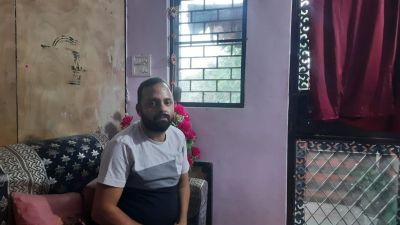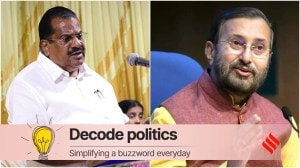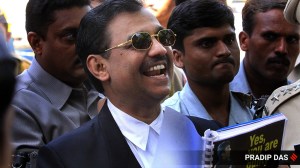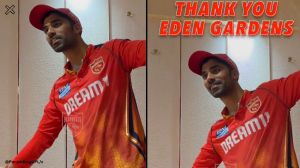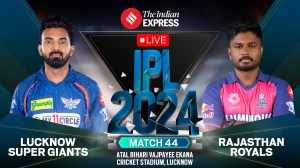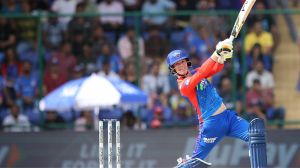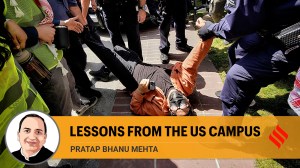- India
- International
How Sanjay Dutt defeated cancer with precision treatment, will power and not getting off the treadmill even on chemo days
Dutt’s oncologist, Dr Sewanti Limaye, Director, Medical and Precision Oncology, Sir H N Reliance Foundation Hospital and Research Centre, Mumbai, talks about his remission, targetted therapies, the need for grassroot cancer awareness in India and clinical trials
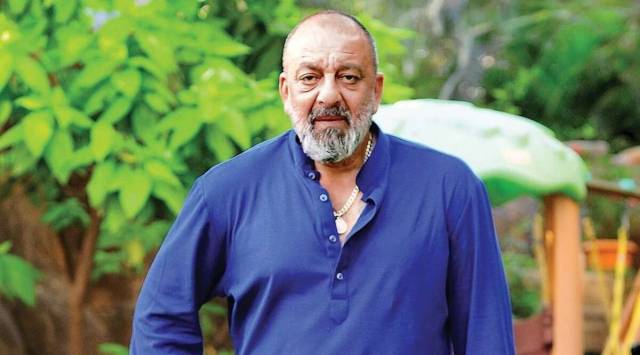 Negativity was never an option for him (Source: Sanjay Dutt/Instagram)
Negativity was never an option for him (Source: Sanjay Dutt/Instagram) When actor Sanjay Dutt walked into the consultation room of his oncologist, Dr Sewanti Limaye, in 2020 — a week after he had been diagnosed with advanced lung cancer — he had made up his mind to brace up, not wilt. And contrary to the depression and crying bouts that he admitted to once he was cured, he was a picture of calm. “He had confronted his hour of reckoning and made a decision. He told me, ‘I am going to go ahead as if I have never had cancer, just focus on getting my life back, breathe and follow whatever discipline is needed to do that.’ Negativity was never an option for him. I would say he came with the most potent therapy there is: his mind, determination and willpower. And that’s more than half the battle won,” says she. Cancer was not new to Dutt, who had lost his mother and first wife to it, and was given a 50:50 chance of survival. And the memories, as he shared with the world once he got better, only gave him a sense of foreboding, about the inevitability of the end. Then he thought about his family and children and decided they were worth a fight. A solid one.
“His mental make-up was very strong, he never hid his illness and took the challenge head on from Day 1. He was open with his family and friends, wasn’t scared to look weak in front of them, was honest with them and accepted their strength as and when required. That’s the second most potent therapy there is, the support of family and friends, who can pull you out of troughs that any cancer therapy entails,” says Dr Limaye. And when you have no family or friends, then the doctor’s rehab unit has patients helping each other, leaning on and learning from each other.
The third weapon was of course Dr Limaye herself, who put him on immunotherapy and worked out a customised protocol that suited his condition best. This is called precision oncology.
WHAT WAS THE THERAPY THAT GOT DUTT OUT OF THE WOODS?
“Precision oncology is not a line of treatment but an approach to treating the cancer specific to you in a specific manner from the word go. It is a form of medicine that uses information about a person’s own genes or proteins to prevent, diagnose or treat disease,” says Dr Limaye. Examples of precision medicine include targetted therapies to treat specific types of cancer cells, such as HER2-positive breast cancer cells, or using tumour biomarker testing to help diagnose the type of cancer.

“It is just an orientation of how you view the case in an individualised manner. For example, you have a 26-year-old breast cancer patient and a 55-year-old ageing one. Now I am used to incidence in ageing women but I should not be using that approach for the young woman. My brain should be oriented towards a series of questions: Does she have a family history of breast or ovarian cancer, is there a gene contributing to the spread? The surgery and therapy will be oriented towards that gene. Similarly, when it comes to advanced lung cancer in a 65-year-old non-smoker, one ought to immediately test genotypical patterns. Then I would go for a bio-markers test and tissue analysis. If the biomarkers exist, then I would go for immunotherapy, for others it could be immunotherapy with chemotherapy. In short, it is not the umbrella test, pill, surgery, chemotherapy and radiation routine. This is targetted therapy that has been strategised for the patient and eliminates both cost and time,” explains Dr Limaye. Most doctors, she feels, do not always recommend the right tests to decode the cancer early and limiting it.
Some treatments go beyond where in the body the tumour is located to focus on particular genetic mutations. While most protocols focus on the cancer genome, considering RNA and proteins could also result in newer forms of targetted treatments.
Dutt did have a biomarker, L1 positive expression, that made him a prime candidate for immunotherapy. “Immunotherapy works great only when a patient has the matching biomarkers. Even those with advanced lung cancer, who were earlier written off as living on borrowed time, can live long with such targetted therapy. Some patients require immunotherapy with chemotherapy. In fact, once the gene alteration is targetted, the patient shows improvement in the first two to three weeks. At the time of the first follow-up test scan, there’s virtually no disease or minimal disease. This form of therapy can lead to remission that’s durable. Patients not only live but can resume normal lives,” says Dr Limaye.
HOW DUTT NEVER MISSED HIS WORKOUTS ON CHEMO DAYS
The biggest advantage of precision oncology is that it helps the patient get back to normal much faster. And Dutt just focussed on working his body and strengthening it. “Often you hear about doctors inspiring patients. But in Dutt’s case I was amazed by his determination to exercise and keep to a disciplined regimen. Nobody knows this but he worked through the treatment. I told him he would feel extremely nauseous and weak and there were indeed bad days. But he didn’t miss workouts even on his days of chemotherapy, and he was given a full dosage of it. I have seen him get on a treadmill on a day of chemotherapy. So many times I would ask him to take it easy but he would do an hour’s worth of exercise. Our rehabilitation team got working with him during therapy itself and got his mental strength up to par,” says Dr Limaye.
Dutt, who now tells his story at many awareness sessions, has even cycled for an hour every day. In Dubai for chemotherapy, he would also play badminton to vary his routines.
PRECISION ONCOLOGY CAN BE AFFORDED BY A FEW. HOW CAN CANCER THERAPIES BE ACCESSIBLE AND AFFORDABLE FOR THE MASSES?
What worries Dr Limaye is that India is going to have a massive burden of cancer and the status of preparedness in the country is minimal. “Cancer is going to touch every household. And while treatment costs continue to be prohibitive, leave aside tech-aided, sophisticated solutions or novel drugs that only the top one per cent can afford, there has to be some budgeting from the government/administration on preventive strategies. That cost will be infinitely lower than bearing the cost burden of treating sick patients, the numbers of whom will go up exponentially. We must educate the masses about the right tests to do and age-appropriate screening besides encouraging the next person to do so,” says Dr Limaye.
Also, awareness needs to be inculcated about the kind of tests to expect when you suspect cancer. “You do expect a blood test, a CT scan but nobody tells you about genomic testing. Cancer is driven by genes. Soon liquid biopsies, where a blood test will be able to detect malignancies, will be part of screening measures in India, too. But prevention has to be in the mass mindset and it is still not a primary concern in our country. Those who come to a cancer centre have already been diagnosed. An awareness campaign is not impossible. We have done this before for cholera and HIV, going from city to city and village to village,” she adds.
HOW CLINICAL TRIALS CAN HELP IN AWARENESS
Dr Limaye is a votary of bringing in transparent and ethical studies in India. “Clinical trials are equal to accessing novel therapies by patients who may be end-stage. If we are part of global research, then we accept these drugs much before and benefit before time. There is enough scientific evidence that these drugs work. So many drugs are evolving by the minute. That’s why we need to participate in cutting edge trials. Poor patients seeking these drugs cannot get them out of pocket. But a trial could give him hope for availing the benefits of research. This is also the time for public-private partnership to reduce a public healthcare burden,” says she.
But she is not without hope. “I came to oncology not to study a discipline but was drawn by the human spirit. There’s bravery in every patient’s will to live and will to fight even if it’s the end. As I said your mind is the greatest conqueror of cancer,” she tells us.
(Dr Limaye has earlier worked at Columbia University Medical Center-New York Presbyterian Hospital, where she worked in Medical Oncology and was Assistant Professor of Medicine. Prior to joining Columbia University, Dr Limaye worked as an Attending in Medical Oncology at the Dana Farber Cancer Institute/Brigham and Women’s Hospital and at the Phase I – Early Drug Development Center – Harvard Medical School in Boston, USA)
Must Read
Apr 27: Latest News
- 01
- 02
- 03
- 04
- 05











